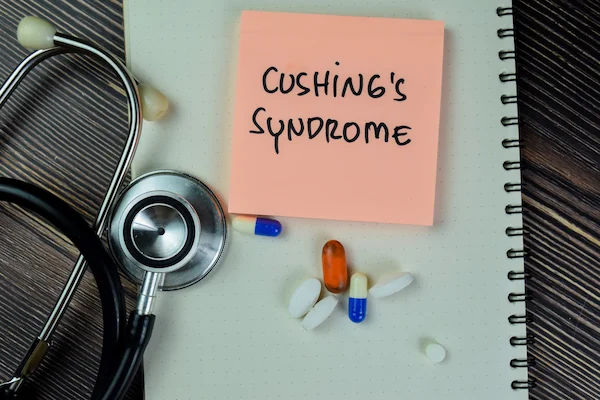Signs of Cushing Syndrome: Recognising the Key Symptoms
know about the Cushing syndrome, what it is, causes, diagnosis, treatment options and preventing complications.

Written by Dr. M L Ezhilarasan
Reviewed by Dr. Rohinipriyanka Pondugula MBBS
Last updated on 13th Jan, 2026

Introduction
Have you been experiencing unexplained weight gain, primarily around your midsection and face, but your arms and legs seem thinner? Perhaps you’ve noticed new, vivid stretch marks or find yourself bruising from the slightest bump. While these might seem like separate issues, together they can be the telltale signs of Cushing syndrome, a complex endocrine disorder caused by prolonged exposure to high levels of the hormone cortisol. This article will guide you through the key indicators, underlying causes, and the importance of seeking a formal diagnosis to manage this challenging syndrome effectively.
What is Cushing Syndrome? A Hormonal Imbalance
Cushing syndrome is an endocrine disorder triggered by an excess of the hormone cortisol in your body. Cortisol is vital for life it helps manage stress, regulate blood pressure, reduce inflammation, and control your body's use of carbohydrates, fats, and proteins. However, problems arise when there's too much of it for too long. This hormonal deluge disrupts nearly every system in your body, leading to a distinct set of physical and psychological symptoms. It's a rare condition, affecting an estimated 10-15 people per million each year, but its impact on quality of life is significant.
Consult an Endocrinologist for Personalised Advice
Cortisol: The Body's Built-In Alarm System
Think of cortisol as your body's built-in alarm system. In a "fight-or-flight" situation, your adrenal glands release a surge of cortisol, providing a burst of energy, heightening memory functions, and lowering pain sensitivity. This is perfectly normal and healthy. The issue with Cushing syndrome is that this alarm system is stuck in the "on" position. The body is constantly flooded with cortisol, leading to a state of chronic stress that wreaks havoc on its normal metabolic processes.
When Good Hormones Go Bad: The Root of the Problem
The excess cortisol can originate from two main sources: outside your body (exogenous) or from within (endogenous). The most common cause is exogenous, stemming from long-term, high-dose use of corticosteroid medications like prednisone, which are used to treat inflammatory diseases like lupus, asthma, and rheumatoid arthritis. Endogenous Cushing syndrome is rarer and occurs when the body itself produces too much cortisol, often due to tumours.
The Most Common Signs and Symptoms of Cushing Syndrome
The symptoms of Cushing syndrome develop gradually and can be mistaken for other common conditions like metabolic syndrome or simply "getting older." However, it's the specific combination of symptoms that raises a red flag for doctors.
Physical Changes You Can See
The most recognisable symptoms of high cortisol are the visible physical transformations.
Weight Gain and Fatty Tissue Deposits
This is a hallmark sign. Weight gain is central and progressive, primarily accumulating in the abdomen, chest, and face, while the arms and legs remain slender or even lose muscle mass. This leads to two classic features:
- * Moon Face: The face becomes round and red.
- * Buffalo Hump: A fatty hump develops between the shoulders on the upper back.
Skin Changes:
Thinning, Bruising, and Stretch Marks: The skin becomes fragile and thin. It bruises incredibly easily, and wounds heal slowly. Wide, pinkish-purple stretch marks, known as striae, often appear on the abdomen, thighs, breasts, and arms. The skin may also darken in certain areas, and women may experience excessive hair growth (hirsutism) on the face, neck, chest, and abdomen.
Internal Symptoms You Can Feel
Beyond what's visible, the internal effects are equally debilitating.
Severe Fatigue and Muscle Weakness
Despite the high-energy hormone, individuals experience profound fatigue. Proximal muscle weakness is common, making it difficult to rise from a chair or climb stairs.
Cognitive and Emotional Effects
High cortisol levels significantly impact mental health. Common issues include irritability, anxiety, difficulty concentrating ("brain fog"), and depression. This emotional lability can strain personal and professional relationships.
Other common signs include high blood pressure, osteoporosis (leading to easy bone fractures), glucose intolerance or type 2 diabetes, and, in women, irregular or absent menstrual periods.
What Causes Cushing Syndrome?
Understanding the cause is essential for determining the correct treatment.
Exogenous Cushing Syndrome: Medication-Related
This is the most prevalent form. It results from taking oral corticosteroids, like prednisone, in high doses over an extended period. Injectable and high-potency topical steroids can also cause it if used heavily. The good news is that this form is reversible once the medication is safely tapered under a doctor's supervision.
Endogenous Cushing Syndrome: Internal Overproduction
This occurs when the body's own systems malfunction.
Pituitary Adenomas (Cushing's Disease)
The most common cause of endogenous Cushing syndrome. A benign tumour on the pituitary gland produces excess Adrenocorticotropic Hormone (ACTH), which overstimulates the adrenal glands. This specific type is called Cushing's disease.
Ectopic ACTH Syndrome
Sometimes, a non-pituitary tumour (e.g., in the lungs, pancreas, or thyroid) begins producing ACTH, mimicking the pituitary's signal.
Adrenal Tumours
A benign or cancerous tumour directly on the adrenal gland can cause it to overproduce cortisol independently, regardless of ACTH signals.
How is Cushing Syndrome Diagnosed?
Diagnosing this syndrome is a multi-step process, as no single test is perfect. If your doctor suspects Cushing's based on your symptoms, they will begin with screening tests.
The First Step: Screening Tests
- 24-hour Urinary Free Cortisol Test: Measures the amount of cortisol in your urine over a full day.
- Late-night Salivary Cortisol Test: Cortisol levels are normally very low at night. This test checks for an abnormal nighttime spike.
- Low-dose Dexamethasone Suppression Test: You take a dose of dexamethasone (a synthetic cortisol) at night, and your blood cortisol is measured the next morning. In a healthy person, dexamethasone should suppress cortisol production. If it doesn't, it suggests Cushing's.
Confirming the Diagnosis: Differential Tests
If screening tests are positive, further tests like the high-dose dexamethasone suppression test or a CRH stimulation test help differentiate between a pituitary (Cushing's disease) and an ectopic or adrenal source.
Locating the Source: Imaging Studies
Once the blood tests point to a source, imaging studies like MRI (for the pituitary gland) or CT scans (for the adrenal glands and chest/abdomen) are used to locate and visualise any tumours.
Given the complexity of these tests and their interpretation, it is crucial to be under the care of an endocrinologist. If you are experiencing a cluster of these symptoms, consult an endocrinologist online with Apollo24|7 for a preliminary evaluation and guidance on the next steps.
Treatment Options: Restoring Balance
The goal of treatment is to lower the high cortisol levels in your body, which will reverse the symptoms. The approach depends entirely on the cause.
Treating Medication-Induced Cushing's
For exogenous Cushing's, your doctor will carefully wean you off the corticosteroid medication. This must be done gradually to allow your body's natural cortisol production to restart, avoiding a dangerous adrenal insufficiency crisis. Never stop taking corticosteroids abruptly.
Surgical, Radiological, and Pharmaceutical Interventions
For endogenous Cushing's:
- Surgery: The primary treatment. Surgeons will remove the tumour causing the problem (pituitary, adrenal, or ectopic).
- Radiation Therapy: Used if surgery isn't fully successful or isn't an option for a pituitary tumour.
- Medications: Drugs that inhibit cortisol production or block its effect on tissues can be used if surgery and radiation aren't effective.
- Adrenalectomy: In severe, unmanageable cases, removing both adrenal glands may be necessary, requiring lifelong hormone replacement therapy.
Potential Complications of Untreated Cushing Syndrome
Leaving Cushing syndrome untreated is dangerous. The chronic high cortisol exposure leads to severe complications, including:
- Cardiovascular disease and severe hypertension
- Type 2 diabetes
- Osteoporosis and spontaneous fractures
- Frequent and unusual infections due to a suppressed immune system
- Increased risk of blood clots
- Loss of muscle mass and strength, leading to disability
- Severe psychiatric symptoms, including depression and psychosis
This underscores why early recognition and treatment are not just about improving quality of life but are critical for long-term health.
Conclusion
Recognising the signs of Cushing syndrome is the pivotal first step on the path to wellness. This condition, with its distinctive yet often misunderstood symptoms, can make you feel like your body is working against you. However, it's important to know that effective treatments exist and can successfully reverse most symptoms, allowing you to regain control of your health and your life. Seeking answers is an act of self-advocacy and the most important move you can make toward a healthier future.
Consult an Endocrinologist for Personalised Advice
Consult an Endocrinologist for Personalised Advice

Dr. Tripti Sharma
Endocrinologist
7 Years • DM Endocrinology MD Medicine
Hyderabad
Apollo Hospitals D R D O kanchanbagh, Hyderabad
(75+ Patients)
Dr Kalpana Dash
Endocrinologist
30 Years • M.B.B.S. , M.D. (GENERAL MEDICINE), D.N.B. in Endocrinology , D.M ( ENDOCRINOLOGY )
Raipur
Apollo Sugar Clinics, Raipur, Raipur

Dr. Ramalinga Reddy
General Physician
5 Years • MBBS MD General medicine
Bengaluru
PRESTIGE SHANTHINIKETAN - SOCIETY CLINIC, Bengaluru
Dr Sumanth R
General Physician
2 Years • MBBS
Bengaluru
PRESTIGE SHANTHINIKETAN - SOCIETY CLINIC, Bengaluru

Dr. Amrutha G
General Physician/ Internal Medicine Specialist
10 Years • MBBS,DNB(family medicine), Diabetologist-CCEBDM,CCGDM
Bengaluru
Apollo Clinic, Sarjapur Road, Bengaluru
Consult an Endocrinologist for Personalised Advice

Dr. Tripti Sharma
Endocrinologist
7 Years • DM Endocrinology MD Medicine
Hyderabad
Apollo Hospitals D R D O kanchanbagh, Hyderabad
(75+ Patients)
Dr Kalpana Dash
Endocrinologist
30 Years • M.B.B.S. , M.D. (GENERAL MEDICINE), D.N.B. in Endocrinology , D.M ( ENDOCRINOLOGY )
Raipur
Apollo Sugar Clinics, Raipur, Raipur

Dr. Ramalinga Reddy
General Physician
5 Years • MBBS MD General medicine
Bengaluru
PRESTIGE SHANTHINIKETAN - SOCIETY CLINIC, Bengaluru
Dr Sumanth R
General Physician
2 Years • MBBS
Bengaluru
PRESTIGE SHANTHINIKETAN - SOCIETY CLINIC, Bengaluru

Dr. Amrutha G
General Physician/ Internal Medicine Specialist
10 Years • MBBS,DNB(family medicine), Diabetologist-CCEBDM,CCGDM
Bengaluru
Apollo Clinic, Sarjapur Road, Bengaluru
More articles from Cushings Syndrome
Frequently Asked Questions
What is the difference between Cushing syndrome and Cushing's disease?
Cushing's disease is a specific type of Cushing syndrome. It refers only to cases caused by a pituitary tumour producing excess ACTH. Cushing syndrome is the umbrella term for all conditions resulting from high cortisol, regardless of the cause.
Can Cushing syndrome be cured?
Yes, in many cases, it can be effectively cured. The success rate depends on the cause. Surgical removal of a benign tumour often leads to a full cure. Even when a complete cure isn't possible, the symptoms can be successfully managed with medication and other therapies.
How quickly do symptoms appear?
Symptoms develop very gradually, often over many months or even years. This slow progression is why it is frequently missed or misdiagnosed initially.
Is weight gain from Cushing syndrome reversible?
Yes, one of the most positive outcomes of successful treatment is the reversal of abnormal weight gain and fat deposits. Patients often lose the characteristic 'moon face' and 'buffalo hump' over time following treatment.
What should I do if I think I have Cushing syndrome?
Schedule an appointment with your primary care physician or an endocrinologist. Before your appointment, prepare a detailed history of your symptoms, a list of all medications (especially steroids like prednisone), and any personal medical history. This will help your doctor make a thorough assessment.
